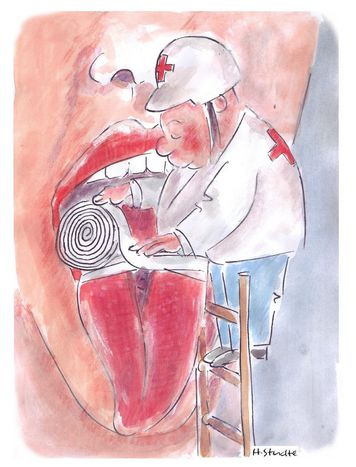
Tongue twisters
Published on
Translation by:
Annie RutherfordRed lorry, yellow lorry, red lorry, yellow lorry - and its European counterpart expressions to say over, and over, again. From Poland's Jerzy to Spain's coconuts, it's the weekly language tricks
At parties, tongue twisters are simultaneously ice breakers and an indicator of how much someone has drunk. It's not just in beach bars that people wonder: Which wristwatch is a Swiss wristwatch? Another popular British tongue-twister is Red lorry yellow lorry red lorry yellow lorry
Another popular British tongue-twister is Red lorry yellow lorry red lorry yellow lorry .
.
The Polish and French virelangue feature 'Jerzy' and a hunter as their respective main characters: Idzie Jerzy i nie wierzy, że na wieży jest sto jeży i pięćdziesiąt jeżozwierzy (Jerzy goes and does not believe that there are 100 hedgehogs and 50 porcupines in the tower), and Un chasseur sachant chasser sais chasser sans son chien de chasse (a hunter who knows how to hunt can also hunt without his dog).
(a hunter who knows how to hunt can also hunt without his dog).
Italian and German tongue-twisters make use of locations: in South Tyrol, you have to reckon with wandering locals with this sciogli lingua ('loose tongue'): Trentatré Trentini entrarono a Trento, tutti e trentatré, trotterellando (33 people from Trient come to Trient and all 33 trot). The German Zungenbrecher ('tongue-breakers') is as follows: Im Potsdamer Boxclub boxt der Potsdamer Postbusboss
(33 people from Trient come to Trient and all 33 trot). The German Zungenbrecher ('tongue-breakers') is as follows: Im Potsdamer Boxclub boxt der Potsdamer Postbusboss (in the Potsdam boxing club the Potsdam postbus boss is boxing).
(in the Potsdam boxing club the Potsdam postbus boss is boxing).
But the longest trabalengua ('confused tongue') gong goes to the Spanish:Compadre, cómprame un coco. Compadre, coco no compro, que el que poco coco come, poco coco compra . (Mate, buy me a coconut. Mate I'm not buying a coconut because those who eat few coconuts only buy few coconuts.)
. (Mate, buy me a coconut. Mate I'm not buying a coconut because those who eat few coconuts only buy few coconuts.)
See more from our resident illustrator, Henning Studte, here
Translated from Zungenbrecher



